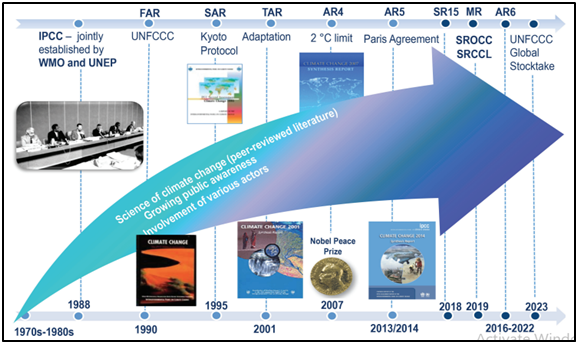What are IPCC’s Assessment Reports
19-02-2024
10:19 AM
1 min read

What’s in Today’s Article?
- Why in News?
- What is IPCC and its Assessment Reports?
- The Sixth Assessment Report (AR6) and Afterwards
- What is Meant by ‘Global Stocktake’?
- The Second ‘Global Stocktake’

Why in News?
- Since 1988, the UN Intergovernmental Panel on Climate Change (IPCC) has produced six assessment reports that provide guidelines for estimating greenhouse gas emissions and removal.
- These documents - prepared by scientists from the 195 countries (part of the UNFCCC) - examine the science, consequences, adaptation, and vulnerability as well as the mitigation aspects of climate change.
What is IPCC and its Assessment Reports?
- IPCC is an intergovernmental body of the UN constituted to advance scientific knowledge about climate change caused by human activities.
- The World Meteorological Organisation (secretariat of IPCC is in Geneva, hosted by the WMO) and the UN Environment Programme (UNEP) established the IPCC in 1988 (endorsed by the UN in 1989).
- It has 195 member states who elect a bureau of scientists to serve through an assessment cycle.
- The bureau selects experts to prepare IPCC reports. It draws the experts from nominations by governments and observer organisations.
- Through its multiple assessment cycles beginning 1990, the IPCC has collated and analysed research by scientists on
- Global warming,
- The role humans have had in exacerbating it,
- The long-term climate impact from current and future emissions and what people can do about it.
- The IPCC does not itself undertake scientific assessments but only evaluates the state of scientific evidence on various aspects of climate change.
The Sixth Assessment Report (AR6) and Afterwards
- Key highlights of the AR6:
- The report does not weigh in on new scientific evidence but synthesises findings from three working groups and also integrates evidence from three special reports during the sixth assessment cycle, which began in 2015.
- The report was finalised at IPCC's 58th Session (13 to 17 March 2023) in Interlaken, Switzerland.
- The AR6 warned that the time to limit the rise of the world’s average surface temperature to 5 degrees Celsius from the pre-industrial era (as agreed in the Paris Agreement) is running out.
- Also, the world is close to breaching adaptation limits.
- It suggested some options and strategies to slow warming, and to adapt and build resilience in natural systems, in human-made systems, and in communities.
- What follows AR6?
- After the AR6 synthesis report, the IPCC initiated its seventh cycle (AR7) by electing an IPCC bureau.
- In (January) 2024, bureau members met for the first time in Turkey to discuss budgeting issues, timelines for the various reports, and the work programme.
- Prior to this, member countries made a suggestion to guarantee that appropriate IPCC input is available for the 2nd global stocktake, which is scheduled to conclude in 2028.
What is Meant by ‘Global Stocktake’?
- To assess the world’s progress towards the goals of the Paris Agreement, UNFCCC countries conduct a ‘global stocktake’ (GST) every five years.
- The GST is a mechanism to measure collective progress, identify gaps, and chart a better course of climate action.
- The first GST started in 2022 and ended at the 28th session of the Conference of the Parties (COP28, Dubai) to the UNFCCC in 2023.
- The first GST text, agreed by the member countries at the COP28, requested the IPCC to consider ways in which its work can be aligned with subsequent stocktakes.
The Second ‘Global Stocktake’
- The second GST is due in 2028; and member countries have requested the IPCC to publish its AR7 assessment reports before so that countries could measure their progress against the state of the planet.
- But the bureau couldn’t reach a consensus on the release date, because each assessment report in the past has required at least four years from start to finish.
- Countries also said a shortened cycle could compromise the content as not enough new research papers may be published to understand the changes in climate to the full extent.
Q1) What is the Paris Agreement?
The Paris Agreement is an international treaty on climate change adopted in 2015. As of now, 195 members of the UNFCCC are parties to the agreement that covers climate change mitigation, adaptation, and finance.
Q2) What is the United Nations Environment Programme (UNEP)?
The UNEP is responsible for coordinating responses to environmental issues within the United Nations system. It was established by Maurice Strong, its first director, after the United Nations Conference on the Human Environment in Stockholm in June 1972.


